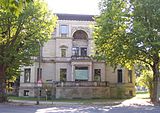Bruno Eelbo
Bruno Heinrich Eelbo (born October 10, 1853 in Bremerhaven ; † November 17, 1917 in Weimar ) was a German architect and writer.
Life
Bruno Eelbo was born the son of a savings bank director. His father was a Flemish from the French department of North , who took the name Eelbo when he moved from England to Bremen.
Bruno's father and teacher recognized his talent for (construction) drawing at an early stage and advised him to choose construction as a professional objective. So Eelbo completed an apprenticeship as a bricklayer, his time as a trainee and became a construction manager and draftsman in various workshops. From 1873 to 1874 Eelbo worked in the studio of the architect Ludwig Bohnstedt in Gotha . According to his own statements, he came across Bohnstedt by chance and owed him all of his artistic training. During this time he also did his military service as a one-year volunteer and went on a one-year study trip to Italy.
In 1878 he started his own business in Gotha. He worked on interior design and was active in various fields of the arts and crafts. In addition to tables, chairs, cupboards, stoves, lamps and watercolors for diplomas and designs for lithographs, he also built houses.
His architectural work, some of which he created in collaboration with Karl Weichardt , includes representative villas and administrative buildings, often in the eclectic style ; u. a. in Gotha the Schäferstift in Schäferstrasse 10 (today the “Children and Youth Center Big Palais”) and three villas in Helenenstrasse (e.g. house no. 9). For himself he created a summer house above the Leinatal near Finsterbergen . In Weimar he created buildings for the state credit institution and the Thuringian state insurance company. The most important areas of activity of Eelbo were the cities of Leipzig , Dresden , Chemnitz and other cities of the Saxon industrial sector, but also Essen .
From Gotha, Eelbo was appointed to Weimar as a ducal building officer in 1882. One of his tasks was the intensification of the decayed arts and crafts in Bürgel and Gerstungen . In 1890 he set up an architecture office in Leipzig with the named Karl Weichardt (later professor at the Technical University in Dresden). In 1903 Eelbo was involved in founding the Association of German Architects (BDA) in Frankfurt am Main .
In 1889 Eelbo published a volume of poetry with the title "Sunny Days", followed by a festival play "Vitruvus Sendung". Various volumes of poetry and other works followed. His play "Irminfried" was performed in Weimar and Leipzig. After 1903 he devoted himself only to writing.
Eelbo died in Weimar on November 17, 1917.
plant
buildings
- 1891: Villa Carl Beckmann in Leipzig (with Karl Weichardt )
- 1892–1894: Herfurthsche Villa (Leipzig)
- 1892–1893: Thüringische Landesversicherungsanstalt, Erfurter Straße 38, Weimar
- 1893–1894: Gotha House of Insurance History , formerly Landesversicherungsbank, Gotha, Bahnhofstrasse 3a
- 1894: Schäferstrasse 10, Gotha
- 1898: Emminghaus villa in Gotha, Schöne Allee 2
- 1898–1901: Gutenberghalle of the German Book Trade House , Leipzig
- Buildings by Bruno Eelbo
Fonts
- Sunny days. Songs from an old sketchbook , 1888.
- Vitruvius's mission , 1892.
- Storm surge . Play in three acts. 1900.
- The Sayings of the Good Master , Poems, 1900.
- The school of love. A funny game in verse , 1902.
- Bacons discovered documents. The solution to the Bacon-Shakespeare question in the Shakespeare folio edition of 1623. 1914–1917.
literature
- Hermann Heckmann : 150th birthday of Bruno Heinrich Eelbo . In: Mitteldeutsches Jahrbuch für Kultur und Geschichte , 2003, ISBN 3-89923-031-0 , pp. 291f.
- Gottlieb Schneider: Gothaer Memorial Book. Third revised and enlarged edition of the Gothaer Wegweiser. Gotha 1906, pp. 74-76.
- Eelbo, Bruno Heinrich . In: Deutsches Literatur-Lexikon , Volume 3, pp. 923 f.
Individual evidence
- ^ Helmut Roob, Günter Scheffler: Gothaer personalities , ISBN 3-932081-37-4 , Thino-Verlag, 2nd edition 2006, p. 36.
Web links
- Curriculum vitae at the Friends of the German Insurance Museum (by Horst Gröner)
- Catalog raisonné at Thuringian Literature Council
| personal data | |
|---|---|
| SURNAME | Eelbo, Bruno |
| ALTERNATIVE NAMES | Eelbo, Bruno Heinrich |
| BRIEF DESCRIPTION | German architect and writer |
| DATE OF BIRTH | October 10, 1853 |
| PLACE OF BIRTH | Bremerhaven |
| DATE OF DEATH | November 17, 1917 |
| Place of death | Weimar |



